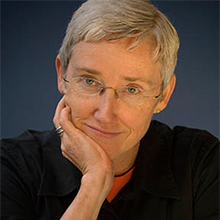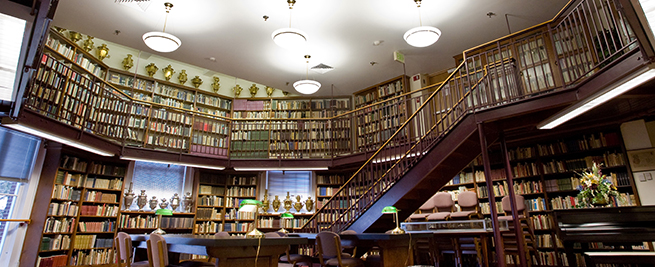when trees write если деревья пишут,
it’s to the white flowers то белым цветам,
that walked the garden что ходили по саду.
when birds do если птицы,
it’s of what can’t be sung о том, чего спеть нельзя.
lumps do not speak, комья не говорят,
in flowerpots по цветочным горшкам
they have buried silence. зарыли молчание.
—Anna Glazova —Анна Глазова
In continuation of an already rich Amherst poetic tradition, Catherine Ciepiela ’83, professor of Russian literature and poetic translation, has put together a bilingual anthology of contemporary Russian poetry. The book, Relocations: Three Contemporary Russian Women Poets (Zephyr Press, 2013), draws from a community of poets and translators that Ciepiela herself has helped to develop. It has already garnered academic acclaim, serving as the subject of a day-long Boston University “Russian Voices” symposium in November.

“The fall of the Soviet Union released creative energies that have shaped a new Russian poetry,” Ciepiela writes in the book’s introduction. “[The featured poets] belong to the generation that has led this epochal transformation. Born in the 1970s, they are old enough to have visceral memories of Soviet life but young enough to move adeptly with the new influences, new media and new choices introduced in the post-Soviet era. Their generation is the last one raised on Russian modernism, which these poets are renovating from within.” The classical eras of modern Russian literature centered on cultural icons like Alexander Pushkin and Anna Akhmatova. Postmodernism continues modernism’s focus on everyday life, culture and politics, while abandoning much of modernism’s mysticism and deification of the individual poet.
The anthology features works from Maria Stepanova, founder and editor of Openspace.ru (now Colta.ru), Russia’s equivalent of The Huffington Post; Polina Barskova, current Hampshire College associate professor of Russian literature and famously prolific young author; and Anna Glazova, a scholar of modern German literature who has published Russian translations of major German-language authors, including Paul Celan and Unica Zürn. Stepanova and Glazova are recipients of the prestigious Andrei Bely Prize, Russia’s oldest independent literary award, which famously consists of exactly one apple, one ruble and one bottle of vodka—a prize that is both representative of the austerity of the Russian literary tradition and completely nondependent on corporate sponsorship. Speaking on Relocations’ unusual focus on only three authors, a rarity amongst anthologies, Ciepiela says, “They are representative of the current scene … where women are more influential than ever.”
The symposium, which took place on Nov. 20, was hosted by Boston University’s Center for the Study of Europe as part of its “European Voices” series—a sequence of conversations where “artists and writers, activists and intellectuals [explore] questions at the intersection of politics and culture.” All three poets, alongside Ciepiela and Sibelan Forrester—two of the translators —headed readings and conversations about the poetry and its commentary on contemporary culture and politics. The discussions featured enough content to merit their own separate project: a recording and transcription that will be shared online with Russian audiences. “The poets thought that [they had just shared] a very special moment,” Ciepiela said.
Ciepiela earned her B.A. in interdisciplinary studies from Amherst College in 1983 and has been a member of the Russian department faculty since 1989. She has published and co-edited several critically recognized works and anthologies of poetry and has received fellowships from Yale, the National Endowment for the Humanities and the Mellon Foundation. She is also a co-leader of the Working Group on Contemporary Russian Poetry, a project launched with a Faculty Research Award Program grant that she won in 2000.
An active member of the Russian poetic community, Ciepiela continues to host many top-name Russian poets at Amherst whenever they come to tour the United States, a tradition started by Stephanie Sandler, a Russian literary scholar who taught Ciepiela when she was at Amherst. “It’s a little remarkable, actually,” says Ciepiela: “All of these big poets—they tell one another to be sure to stop at this little college on their way to Harvard.”

Inside the Amherst Center for Russian Culture
Stanley Rabinowitz, Amherst’s Henry Steele Commager Professor and Professor of Russian, finds the poets’ attraction to Amherst—and to the Amherst Center for Russian Culture, where their readings are held—to be of no surprise at all. “For the poetry readings, you couldn’t find a better place than the Russian Center,” he says “I think they love it because it is a memorable time for them to stand in that room surrounded by beautiful objects in an area as beautiful and historic as Amherst. For many of them, it’s the high point of their trips.”
The historical importance of the Amherst area is strongly connected to its hosting of Joseph Brodsky, former United States poet laureate and winner of the 1987 Nobel Prize in Literature, who worked as a Mount Holyoke and Five College professor of literature from the 1970s until his death in 1996. Commenting on the anthology’s recurring theme of immigration, Ciepiela wrote that Barksova currently “teaches as Hampshire College, on the very same Route 116 in Western Massachusetts where Joseph Brodsky lived when he taught at nearby Mount Holyoke College. You might say she traced his path from the Petersburg scene she depicts in [her poem] ‘1998’ to life in America as an émigré poet.”
In the Spring 2014 semester, Ciepiela and Barskova will co-teach a course at Amherst titled “Modern Russian Poetry in Translation: Text, Image, Sound.”